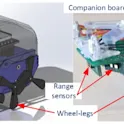Smart ‘Joey’ bots could soon swarm underground to clean and inspect our pipes
By Mischa Dijkstra, Frontiers science writer Joey’s design. Image credit: TL Nguyen, A Blight, A Pickering, A Barber, GH Jackson-Mills, JH Boyle, R Richardson, M Dogar, N Cohen Researchers from the University of Leeds have developed the first mini-robot, called Joey, that can find its own way independently through networks of narrow pipes underground, to inspect any damage or leaks. Joeys are cheap to produce, smart, small, and light, and can move through pipes inclined at a slope or over slippery or muddy sediment at the bottom of the pipes. Future versions of Joey will operate in swarms, with their mobile base on a larger ‘mother’ robot Kanga, which will be equipped with arms and tools for repairs to the pipes. Beneath our streets lies a maze of pipes, conduits for water, sewage, and gas. Regular inspection of these pipes for leaks, or repair, normally requires these to be dug up. The latter is not only onerous and expensive – with an estimated annual cost of £5.5bn in the UK alone – but causes disruption to traffic as well as nuisance to people living nearby, not to mention damage to the environment. Now imagine a robot that can find its […]














